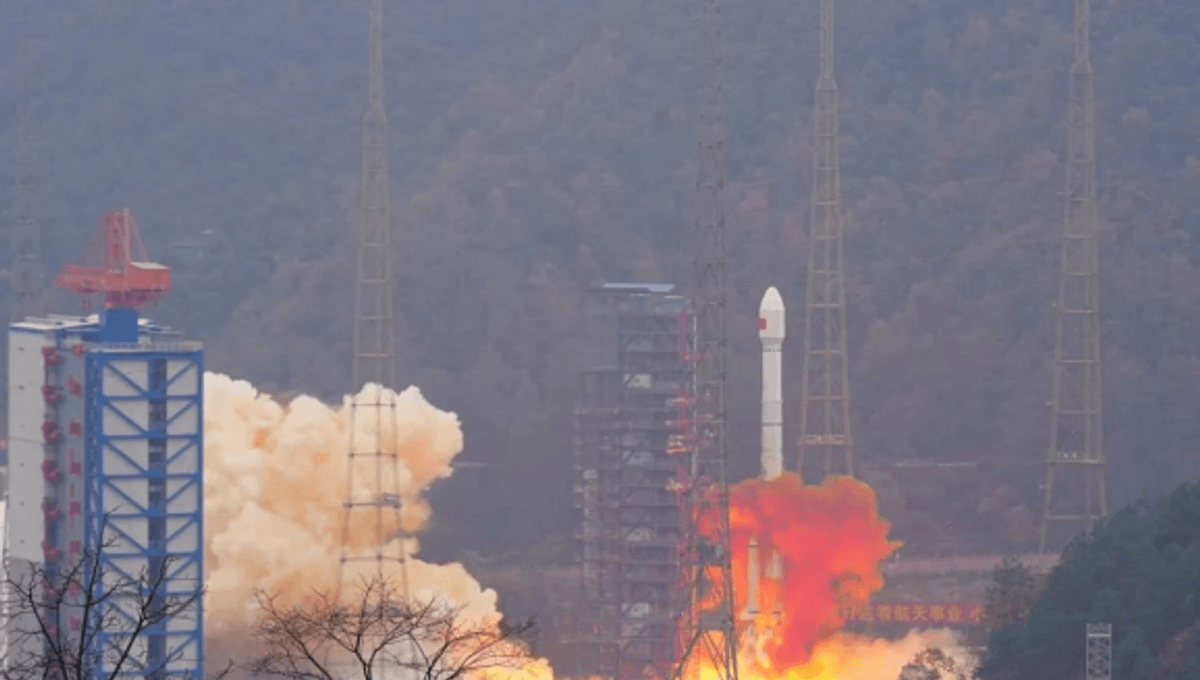
Another launch by China’s space agency has ended with used rocket stages showering an inhabited area after an uncontrolled re-entry. Bystanders in the Guangxi region of China managed to capture the crash-landings on their smartphones, showing a spiraling piece of space junk falling into an inhabited area and exploding in a fiery crash.
The China National Space Administration (CNSA) launched a pair of satellites onboard a Long March 3B/Yuanzheng 1 carrier rocket on December 26 from the Xichang Satellite Launch Center in the Sichuan province, according to an announcement.
The two satellites will be part of the BeiDou Navigation Satellite System, China’s own global navigation satellite system that rivals the United States’s Global Positioning System (GPS). This latest launch put the 57th and 58th Beidou navigation satellites into orbit, which will form part of the satellite constellation behind the BeiDou-3 project.
While the initial launch was deemed a success, numerous videos showed parts of the spent rocket crashing down to Earth. One video shows a rocket falling into a forested area and creating a dramatic fireball, while another shows debris hitting a house.
The footage, first shared on the Chinese social media platform Weibo, was reshared by Andrew Jones, a journalist who reports on China’s space program.
The second bit of footage shows a partially destroyed building surrounded by a cloud of reddish-brown gas, which may be a sign of nitrogen tetroxide rocket fuel, and a yellowish gas, which may be the result of unsymmetrical dimethylhydrazine (UDMH) fuel mixing with air, according to SpaceNews.
This is far from the first time that rocket debris has crash-landed on Earth. Unlike most space agencies, the CNSA regularly practices uncontrolled rocket re-entries that result in debris falling to Earth (and even the Moon) in an unpredictable crashdown.
Luckily, the debris tends to land in the ocean – after all, oceans cover more than 70 percent of the surface of our planet – but they have been known to crash onto land, including inhabited areas. In 2020, for instance, a Chinese rocket landed in a village in Cote d’Ivoire in West Africa.
However, it isn’t just China that’s been accused of recklessly crashing their rocket stages back to Earth. In 2022, Australian farmers found large pieces of space junk thought to be from the SpaceX Crew-1 Dragon, the first commercial mission to deliver astronauts to the ISS. Cheers, Elon!
Back in 1979, parts of NASA’s Skylab space station fell to the small town of Esperance in Australia. In true Aussie style, they jokingly sent a $400 fine to the US for littering, eventually leading President Jimmy Carter to issue an apology to Australia.
As it stands today, there’s only ever been one confirmed case of a person being hit by falling human-made space junk, although researchers believe it’s just a matter of time before it happens again. In 2021, scientists worked out there is a 10 percent chance that one or more people will be hit by falling space debris over the next decade.
With over 8 billion people currently on planet Earth, there’s an unbelievably small chance you’ll ever be struck by a falling piece of rocket – but it’s not out of the realms of possibility.
Source Link: Watch A Chinese Rocket Booster Crash To Earth And Explode Way Too Close To Humans